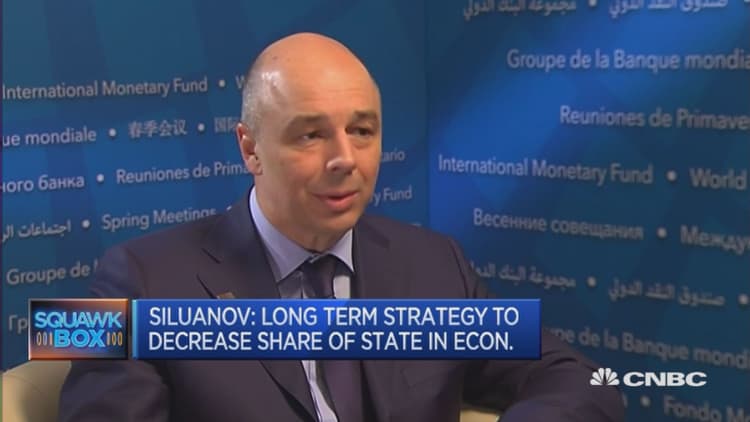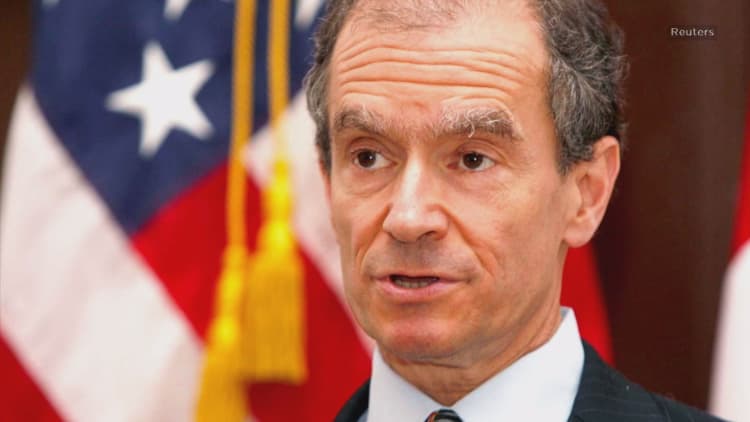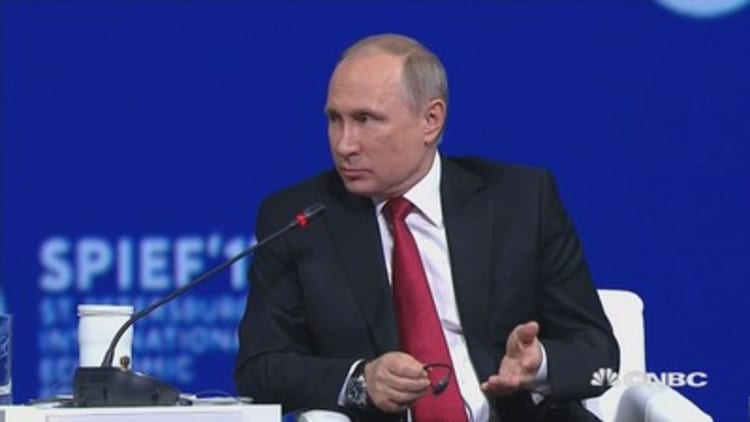Igor Sechin, the Russian securocrat-turned-oil baron, makes his presence felt long before he appears.
As a security guard opens the 5-metre-high white doors and shoos a waiter out of the meeting room, the Rosneft chief executive's aides snap to attention.
Electronic lounge music ripples through the white marble lobby as, across the hallway, a second pair of high doors swing open, revealing the view on to a shiny black floor-to-ceiling Rosneft logo at the end of another immense meeting room.
The stage management complete, Mr Sechin saunters into view.
More from the Financial Times:
May pledges to ramp up battle with extremism
May says 'enough is enough' after London Bridge attack
World Bank warns on emerging market growth
As head of Rosneft, the country's biggest oil producer, and a long-time close associate of President Vladimir Putin, Mr Sechin is one of Russia's most powerful men.
That power put him at the centre of the political storm triggered by Russia's annexation of Crimea in early 2014. The US hit him with a travel ban and an asset freeze in April of that year, part of wide-ranging sanctions that, together with the oil price collapse, pushed the Russian economy into a two-year recession.
Although Rosneft has weathered the crisis surprisingly well, Mr Sechin cannot conceal his resentment.

"To be honest, I don't like to talk about sanctions. I believe they are totally unjustified and even illegal. One cannot transfer political responsibility on to the corporate level. We are not part of the international politics. We do not form policy," he says.
While Rosneft is a publicly-listed company with international shareholders, a controlling 50 per cent stake is held by the state. At times, its business strategy appears to dovetail with the Kremlin.
"The aim [of the sanctions] was to influence, to affect the socio-economic situation. To make it worse and to affect the [Russian] elections. That's my deep conviction," he says.
Proudly recalling the 25 per cent rise in Rosneft's market capitalisation under his first 18 months as chief executive, he complains that the political crisis put a deep dent into that achievement.
"I am sweating to try to bring the capitalisation up. It used to be $93bn. And then somebody decides to impose sanctions. And my capitalisation, the product of my efforts, goes down to $62bn," he says.
"The problems that we could have had because of the sanctions, we are solving those problems without any difficulty. They are not affecting us, so far. But the market views it differently," he adds. Outside, over the music and the sound of chatter, handpicked executives from across the global oil industry wait for Mr Sechin at the company's annual St Petersburg party.

Despite spending most of his career rising through Russia's political system, often as Mr Putin's aide — and with no formal education in geology or engineering — Mr Sechin displays a commanding grasp of the oil industry's technicalities and an understanding of the mechanics and economics of the US shale industry that often escapes many of his traditional crude peers.
And while the immediate impact of the sanctions was a financing crunch that forced Rosneft to ask for assistance from the state in 2014, the company's performance over the past three years has defied those that assumed Russia's oil and gas producers would wither without foreign support.
Between 2013 and 2016 Rosneft's production rose 10 per cent. No other publicly-traded oil company can get a barrel of oil out of the ground at a lower cost, according to the company.
Mr Sechin, a workaholic who rises at 5am and involves himself in all areas of the company's operations, attributes this resilience to "a team that is distinguished by high professionalism, decency, and patriotism in the sense of company patriotism".
"We work very hard," he says. "They kept telling us that private companies operate in a more efficient manner. And I completely disagree with that . . . We obviously demonstrate that we are competitive. We can compete with any market players."
Not that sanctions have held back Mr Sechin's longstanding ambition to turn Rosneft into a big global producer.
This week he is expected to close a deal to take control of Essar Oil, an Indian producer and refiner. Rosneft also owns a stake in a major Venezuelan oil project, is building a refinery in Indonesia and is developing five oilfields in Kurdistan, as part of a number of deals this year to increase its presence in the Middle East market.

"Every good deal, every masterpiece, requires some effort," he says of the Essar acquisition. When challenged on whether the debt-laden company bears comparison to Michelangelo, he replies: "It is more like a Henri Matisse."
The deal, done in conjunction with commodity trader Trafigura, increases Rosneft's total refining capacity by 20m tonnes to more than 120m tonnes a year, gives it control of a deepwater port on the Indian Ocean, close to the Gulf, and a national network of 2,700 petrol stations.
"To put it mildly, the Indian market goes through very positive dynamics right now," he says. "I like Essar. It was a challenging project . . . [but] this project is really a gem, a jewel among our projects."
And while sanctions may mean Mr Sechin, Rosneft and Russia currently have a strained relationship with the US energy industry, the resolute former deputy chief of staff to Mr Putin has ambitions for a grand coalition between oil's superpowers: Russia, Saudi Arabia and the US.
While reflecting on President Donald Trump's campaign stance on developing better relations with Russia — which has since been replaced with a more hawkish position in office — Mr Sechin hopes that the influence of Rex Tillerson, the former ExxonMobil chief executive turned US secretary of state, could help usher in a thaw.
"It is true . . . It is really good for the industry," Mr Sechin says. "Our esteemed Rex Tillerson, our former colleague, perfectly understands the synergy that arises from our joint projects."
The two men developed a strong relationship while partnering on multibillion-dollar projects in Russia, and Mr Sechin sees scope for even more ambitious collaboration.
"There are three regulators in the modern world. First is the American oil market, which produces 9.3m barrels per day. Then Saudi Arabia. And then Russia," he says. "So co-ordination of those three leaders, would certainly be beneficial for the market, for the companies, for the shareholders, for everyone."

